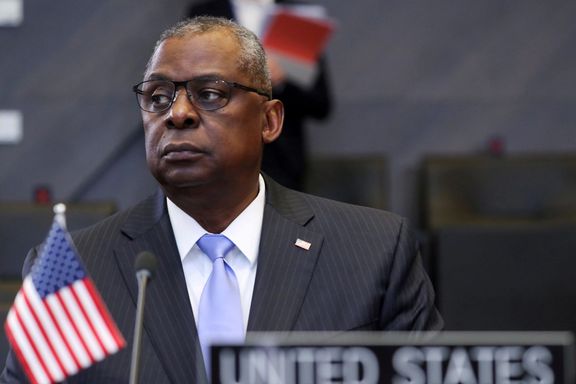Pentagon Chief Tries To Reassure Middle East Allies Amid Iran Talks

Defense Secretary Lloyd Austin sought on Saturday to reassure nervous allies in the Middle East that the Biden Administration was committed to the region.

Defense Secretary Lloyd Austin sought on Saturday to reassure nervous allies in the Middle East that the Biden Administration was committed to the region.
In a speech in Bahrain during a trip to the Gulf, Austin acknowledged concern in the region and globally that the United States was solely focused on China's challenge. He also defended the Biden Administration policy of engaging in talks with Iran over its nuclear program.
"Let's be clear: America's commitment to security in the Middle East is strong and sure," Austin said.
He said the United States was committed to countering Iran, even as Washington works to revive the 2015 nuclear deal. But there has been little forceful reaction to Iran delaying the resumption of nuclear talks, or to intermittent attacks on US forces in Iran and Syria blamed on Tehran’s proxy militias.
"We remain committed to a diplomatic outcome of the nuclear issue. But if Iran isn't willing to engage seriously, then we will look at all the options necessary to keep the United States secure," Austin said.
Austin also pledged to counter Iran's "dangerous use" of suicide drones in the wider Mideast that have proliferated in recent months.
The Pentagon chief said that Washington would be coming to the indirect negotiations on reviving the deal starting on November 29 in Vienna in good faith.
"But Iran's actions in recent months have not been encouraging - especially because of the expansion of their nuclear program," he Austin said.
Gulf states have asked for any deal to address what they call Iran's ballistic missile program and destabilizing behavior in the region.
It was unclear how much impact Austin's speech would have with Washington's allies in the region, since it was not backed by any announcements of further deployments or new weapon sales in the region.
Gulf Arab states, heavily reliant on the US military umbrella, have expressed uncertainty about President Joe Biden's focus on the region, especially after the hasty US withdrawal from Afghanistan. They are now closely watching efforts to revive the 2015 Iran nuclear agreement known as JCPOA, as Tehran continues uranium enrichment and support for proxy forces throughout the Middle East.
'IMPENDING AMERICAN ABANDONMENT'?
While a number of US administrations have tried to move the focus away from the Middle East and towards the Pacific, Biden in August ended the longest US war, in Afghanistan.
"There's dismay that the United States is on its way out the door. I'm not sure messaging addresses that sense of impending American abandonment," Jon Alterman of the Washington CSIS think-tank told Reuters.
A senior US defense official, speaking on condition of anonymity, said Austin was not expected to make new commitments in the region during his trip.
Saudi Arabia, one of Washington's closest regional allies, has been frustrated by the approach of Biden's White House, which has pressed Riyadh to improve its human rights record and end the war in Yemen. Iran’s answer to this has been more missile and drone attacks on Saudi Arabia by its Houthi allies in Yemen.
Former Saudi intelligence chief Prince Turki al-Faisal, attending the Manama security forum, welcomed verbal assurances but said "demonstrative actions are equally important".
He cited the need to prevent Yemen's Iran-aligned Houthis from obtaining arms. Washington is pressing Riyadh to lift a coalition blockade on Houthi-held areas, a condition from the group for ceasefire talks.
Austin was set to visit Saudi Arabia in September, but the trip was postponed at the last minute. He will not be visiting Riyadh on this trip.
Reporting by Reuters and AP